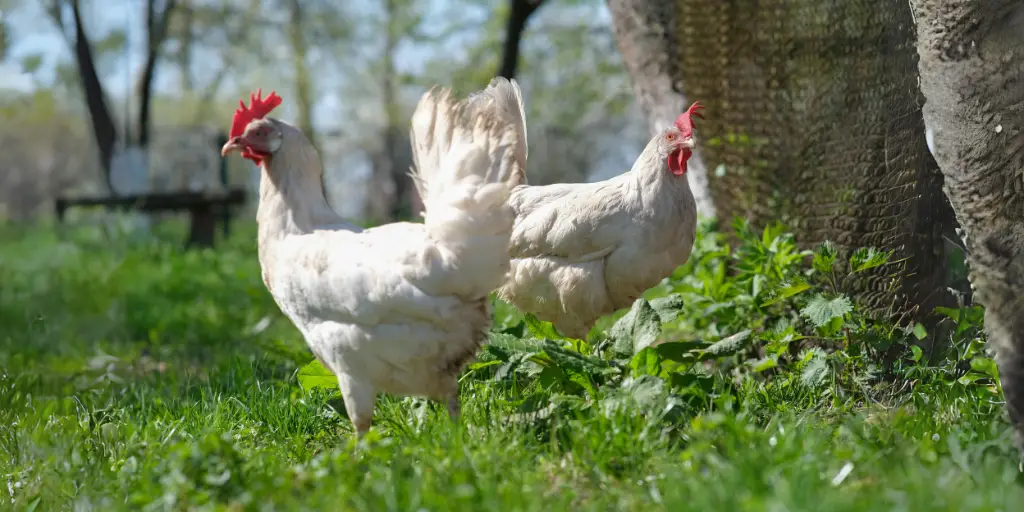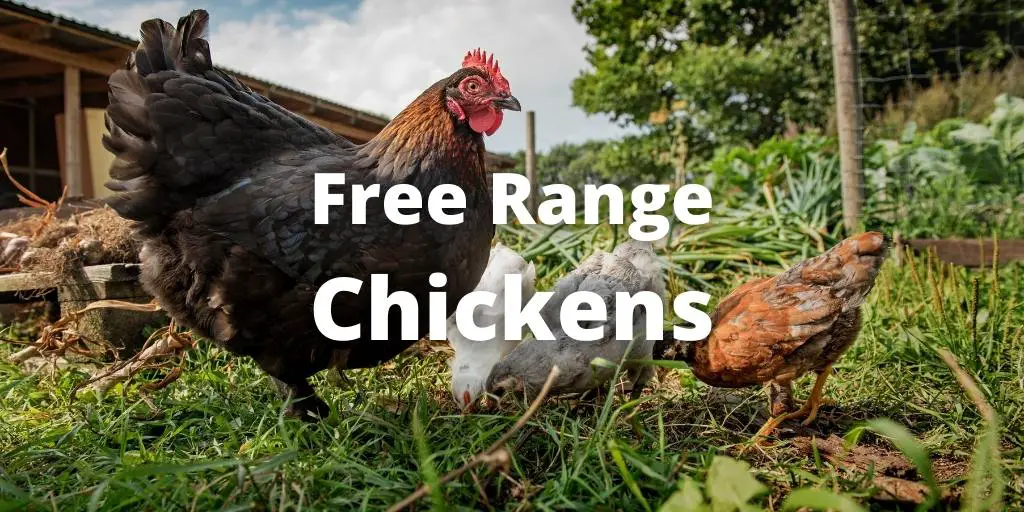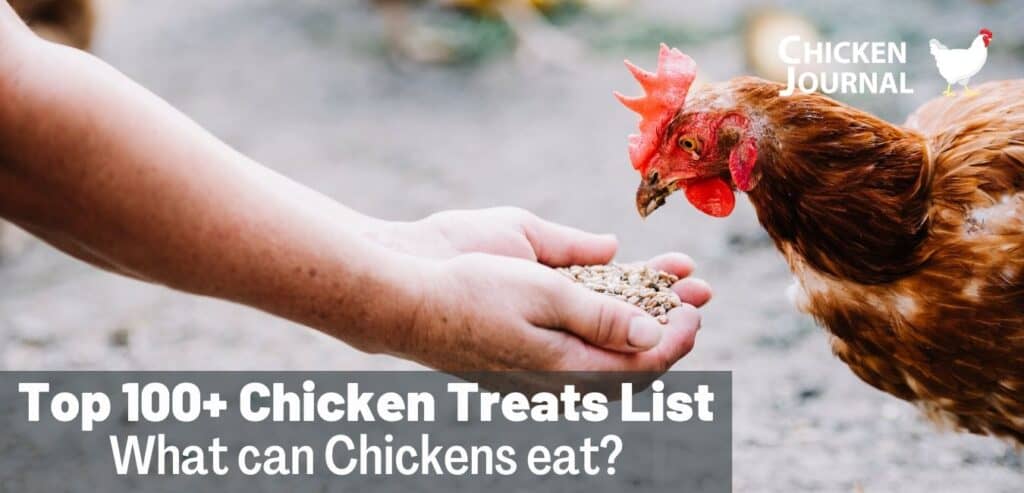Are you worried about what killed your chicken? I have been a chicken farmer for the last twenty years and have experienced this type of situation multiple times.
Everyone who keeps poultry must have had that heartbreaking moment when they lost a chicken or came close to it.
The death of a chicken can be caused by so many things, and sometimes knowing the exact reason is not easy.
A good number of chicken keepers make these fifteen mistakes, which kill their birds in small age.
Below, we have explained those 15 mistakes and also how to avoid them.
This will help you avoid such errors, which helps in increasing the lifespan of your flock.
Also read: 11 Common Mistakes in Poultry Farming: How to Fix Them?
15 Mistakes Which May Accidentally Kill Your Chicken
Below are a few common ways that may kill your chicken flocks. Avoiding these steps and learning the right practices can help you to raise chickens safely.
1. Neglect
Taking care of chickens needs effort. If you neglect and don’t follow the right raising methods, the birds can get sick or die. There are many ways this can happen.
First, if you don’t give them the right foods and clean water, they can’t get the nutrients they need. This makes their bodies weak, and they get sick more easily.
Second, a dirty coop is a bad place for chickens. Germs and bugs can spread and make the whole flock sick.
Other dangers come from outside the coop. If you don’t protect the chickens from predators, they might hurt or kill the birds.
Also, things like very hot or cold weather, bad air, and poisonous things around the coop can harm chickens.
If you don’t give them proper shelter with good airflow and safety from dangers, they could get heat stroke, frostbite, or poisoning, which can kill them.
Even inside a safe coop, the chickens need space and ways to stay calm. If they are too crowded or don’t have things to keep them interested, they get stressed.
Stressed chickens fight more and get hurt. They also get sick more easily and live shorter lives.
Therefore, responsible chicken owners make sure their birds have all they need to stay healthy and live long lives.
2. Pet dog
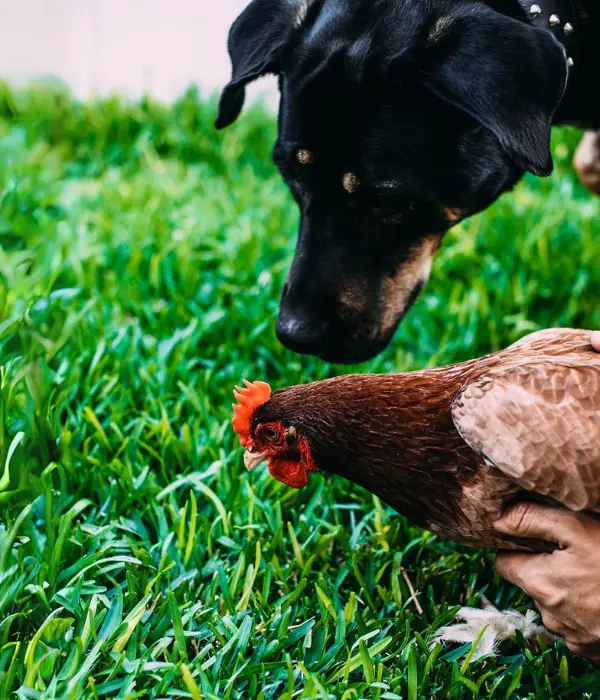
Dogs can sometimes cause big problems for backyard chickens. Even friendly dogs can chase and hurt chickens without meaning to. This is because dogs have hunter instincts from their wild ancestors.
Often, dogs will chase chickens just for fun. But this chase can be very dangerous for the chickens.
Chickens are fragile birds with weak hearts and bones. Running from a dog can cause a chicken to have a heart attack or break a bone.
These dogs may bite or shake the chickens, causing serious injuries or killing them right away.
Even nice family dogs can act on their hunting instincts if they aren’t trained properly around chickens.
Just having a dog around can stress out the chickens. Too much stress can weaken a chicken’s immune system and make it sick more easily.
I have dogs in my backyard, and I have faced this type of problem. Occasionally, they chase my chickens for playing, which causes injuries.
My dogs are well-trained and understand that chickens are not for eating, still, I have seen situations where they eat newly added and weak chickens.
Once I noticed that my dog was eating all the eggs from the nesting box by getting inside the coop.
So, it is better to keep your pet dogs separate from chickens during the daytime and allow them near chicken coops only at nighttime when the coop door is closed.
3. Falling into open water or a well
Water areas like ponds, pools, or wells can be very unsafe for chickens. Chickens can drown if they go in these places.
Chickens are curious birds and may go near water to drink or just look around. But there are a few things that can make this very dangerous for them.
First, chickens cannot swim well. Their feathers get heavy with water quickly. This makes it hard for them to float or move in the water.
If the water is deep or the sides are slippery, the chicken may get too tired to get out and drown.
Second, if a chicken falls into cold water, it can get very sick. Their bodies cannot stay warm in cold water. This sudden cold can make their organs stop working properly, and they may die.
Third, even if a chicken can swim for a little while, it may get lost and not find a way out.
This can happen in wells where the walls are too high for the chicken to escape. Being stuck in the water for too long can make the chicken very weak and it may die.
Also, many open water sources have harmful germs and parasites. If a chicken drinks this dirty water while struggling to stay above water, it could get very sick from waterborne diseases. This makes it even harder for the chicken to survive.
So, it is very important for chicken owners to keep their chickens away from dangerous water areas. Cover wells with strong lids and close the ways towards these water bodies.
Also read: Can chickens swim?
4. Predators
Predators can be a huge problem for chicken owners. They often kill many birds at once. This can hurt the whole flock.
Hawks, owls, and eagles swoop down and grab chickens from above. Hawks hunt in the day, while owls hunt at night. They like to catch young or small chickens, but big birds can also carry off adults.
Foxes, raccoons, opossums, and weasels sneak into coops at night. They can dig under fences or squeeze through holes. They frequently kill many chickens in one attack, leaving a bloody mess.
Pet dogs and coyotes may also go after chickens. Dogs will sometimes chase and kill birds due to their natural instincts. Coyotes are skilled hunters that can wipe out an entire flock.
Some snakes, like rat snakes and black snakes, eat chicken eggs and chicks. They slither into nests unnoticed and swallow the contents. Adult hens are usually too big for snakes, but losing eggs and chicks hurts the flock’s growth.
Predator attacks don’t just kill birds – they also stress the survivors. Stressed hens get sick more easily and lay fewer eggs. The whole flock acts fearful or aggressive after an attack.
To keep your chickens safe, you must guard them from predators. You can do this by making a strong coop where they sleep. You can also put up a standard fence or electric fence. It will shock any animal that tries to get in.
Another thing that works is a device that makes noise or light when it sees movement. This scares predators away.
Check the chicken coop and area around it often. Look for signs that a predator has been there. Know what kinds of animals hunt chickens.
If you go outside for work, adding an automatic chicken coop door is the best option because it will shut the doors on time. Moreover, a coop camera is the best option for keeping an eye on your chickens from the office or when you are away.
Also read: List of all top predators which may kill chickens
5. Poison or Chemicals
Poisons and chemicals can harm chickens a lot. They can make chickens sick, less able to work, or even die. Chickens can get poisoned in a few ways: eating it, breathing it in, or skin contact.
Chickens may eat things that are bad for them, like bug sprays, weed killers, rat poisons, or household cleaners.
Eating poison can make chickens very sleepy, not want to eat, throw up, have loose poop, have trouble breathing, shake uncontrollably, or become paralyzed.
If it’s really bad, eating poison can make chickens’ organs stop working right and they could die.
Chickens can get sick from smelling poisonous air, too. Too much chicken poop can make ammonia gas that stings their noses and lungs.
Broken heaters might let out carbon monoxide gas that chickens breathe in by mistake. Spraying bug sprays near chickens means they’ll breathe in some of those chemicals.
Breathing in poisons can make chickens cough, sneeze, have a hard time breathing, or even suffocate. Breathing a little poison over time can also cause long-term health problems for chickens and make them die sooner than normal.
Some chemicals, like cleaners or bug sprays, can burn or irritate a chicken’s skin if it touches them. The poisons can also get into the chicken’s body through its skin, which makes the chicken sick all over like if it had eaten the poison.
If poison gets into a chicken coop, it can hurt or kill a lot of chickens. The ones that survive might have weaker immune systems, so they get other diseases more easily.
It can also stop hens from laying eggs well or making the eggs unable to hatch baby chicks. Over time, a poisoned flock won’t produce as well.
You must store and use harmful things with care. Make sure there is good airflow in their home. Use safe cleaning items. Do not use bug or weed spray near your birds.
Furthermore, get rid of any food or water that may have risky stuff in it quickly. By being careful, you can protect your hens from poisons and chemicals that could harm them.
6. Lack of food
Lack of food is really bad for chickens. It can make them sick or even die. Chickens need the right foods to stay healthy and strong. Without enough food, bad things can happen.
First, chickens get very tired and weak without food. They can’t do things like finding food, running from danger, or staying warm.
This makes them easy targets for predators or the weather. It’s easy for weak chickens to get hurt or die.
Also, no food makes their bodies use up their own muscles and organs for energy.
This damages their immune system, which helps fight sickness. Even small sicknesses can kill malnourished chickens.
Another problem is that hens stop laying eggs when they don’t get enough food. Hens need nutrients to make eggs. No eggs means no baby chicks and problems for the hen’s body.
In terrible cases, starving chickens may even start pecking and eating each other. Cannibalism happens because they’re so hungry. It causes injuries, infections, and death.
All chickens need food and water to stay healthy. They should eat grains, bugs, and greens to get vitamins.
Keep a close eye on how much they eat. If needed, feed them more or less. When chicken owners feed their birds well, the chickens will stay strong. They will make more eggs and live longer.
Also read: All about feeding chickens
7. Lack of water
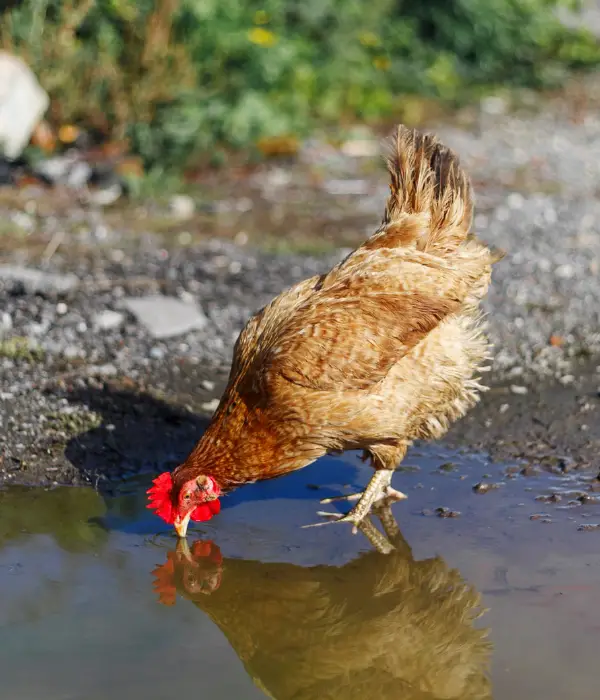
Water is a must for chickens. Without it, they can die quickly. Water helps chickens digest food, stay cool, take in nutrients, and remove waste from their bodies.
First, chickens get tired and weak when they don’t have water. They stop moving much and seem confused. Their combs and wattles may look pale and shrink up.
As it gets worse, their body heat rises, which is really dangerous on hot days. Chickens can’t sweat, so they pant and drink water to cool off.
More dehydration causes organ problems. The kidneys, which filter waste, can’t work right, so toxins build up in the body.
The digestive system shuts down, so chickens can’t absorb nutrients from food. This makes their immune systems weak, so they get sick easily.
In bad cases, chickens may have seizures, collapse, and die. How fast this happens depends on the weather, the chicken’s age and health, and if they have food. But on hot days, chickens can die in just a few hours without water.
Also, without water, hens make fewer eggs. Hens need water to produce eggs. With no water, they lay way fewer eggs or none at all.
This means chickens must have good water every day. Keep their water dishes neat and fill them up often. Make sure the water is clean and not blocked.
By giving chickens plenty of water and watching to see that they drink enough, owners can help keep their chickens safe and healthy.
8. Excessive heat stress
Too much heat can make chickens very sick or even die. Chickens can’t sweat, so they must pant and move around to stay cool. This makes them lose water and get dehydrated, which makes the heat problem worse.
When it’s hot, chickens pant hard to let out heat. They also get tired, don’t want to eat, and lay fewer eggs. Their combs and wattles may turn pale and shrink because less blood flows there.
If it gets really bad, chickens can collapse, have seizures, and die from organ failure. Fat chickens, ones with breathing troubles, and those in poorly ventilated coops are most at risk.
Heat also weakens chickens’ defenses against disease. Their immune systems don’t work as well, so germs can more easily make them sick. When one chicken gets sick, the whole flock may spread the illness, causing many to die.
Furthermore, heat stress disrupts chickens’ reproductive cycles. Hens may stop laying eggs altogether or lay fewer, lower-quality eggs.
Keeping chickens cool is vital. What precautions do you take to prevent heat stress in your flock? Proper ventilation, shade, and cool drinking water can go a long way.
Keeping chickens healthy and safe from the heat is key. Give them shade and cool, fresh water to drink. Set up sprinklers or misters to keep things cool.
Put in fans to move air around. During really bad heat waves, give them frozen treats. Maybe give them some extra minerals, too. Doing all this will protect your chickens from getting sick from the heat.
9. Excessive cold or freezing temperature
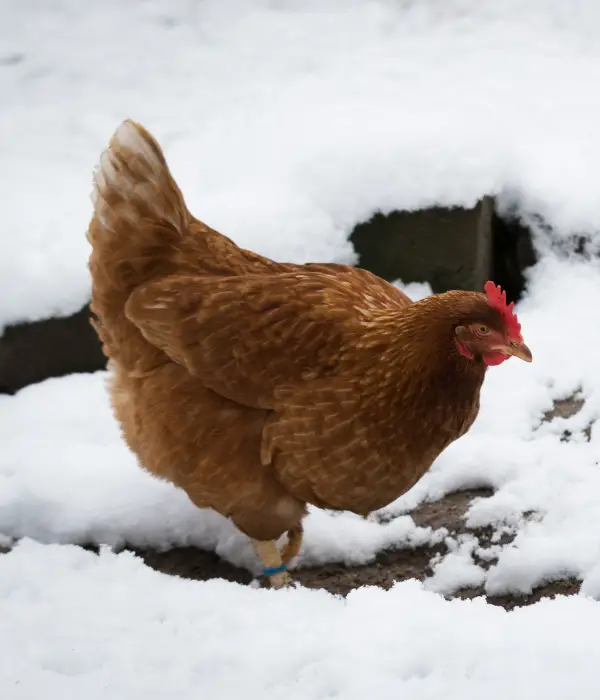
Freezing weather can badly hurt chickens and even kill them. Although chickens can handle some cold, they cannot survive extreme cold for too long.
First, being out in the freezing cold for a long time can give chickens frostbite. Their combs, wattles, and toes are most at risk because the blood does not flow well there.
Frostbite can damage tissue, cause infections, and in bad cases, lead to parts being cut off or death.
Also, cold stress weakens a chicken’s immune system. This makes them more likely to get lung infections like bronchitis and pneumonia.
These make it hard to breathe and cause tiredness and not eating. They also make it harder for chickens to stay warm and fight off the cold.
Hypothermia is another big danger when it’s freezing out. Chickens have fast metabolisms that help them make heat.
But being in the cold for too long overwhelms how they control their temperature. As their body temperature drops, their organs start shutting down, which can lead to death.
Cold weather affects egg laying too. Hens need to be a certain temperature to lay eggs. Extreme cold disrupts this.
If their water freezes, chickens can also get dehydrated. Chickens need water even when it’s cold. Use a heated base chicken coop waterer.
Keeping chickens warm in the cold days is key. Their coop must have good bedding on the floor. The walls need to block wind from getting in.
Heat lamps could help on very cold nights. Fresh, unfrozen water is a must too. If we care for our fine feathered friends this way, they will stay cozy all winter long.
10. Glass, wire, and iron nails
Chickens are curious birds. They can get hurt or even die if they eat glass, wire, or nails on the ground. These things are dangerous for them to peck at or swallow.
Glass shards are very sharp. They can cut the chicken’s throat, crop, or stomach area if swallowed.
This can cause bleeding inside and infections. Even tiny pieces of glass can get stuck and block food from passing through their bodies.
Wire is also a big risk for chickens. If eaten, the wire can wrap around their intestines or get trapped in their gizzard. This stops food from moving and causes pain.
The wire could also poke holes, leading to internal bleeding and infections. Sometimes, the wire even works its way out through the chicken’s body, causing more harm.
Iron nails are just as risky. Their sharp points could puncture a chicken’s organs if swallowed.
This leads to bleeding and infections inside. Plus, the nails can rust and release toxins while still in the chicken’s body, making them even sicker.
But the dangers aren’t just inside. Glass, wire, and nails can also cut or stab a chicken’s feet when stepped on.
This causes cuts, holes, and infections on their feet. It makes it hard for them to walk, find food, or escape predators.
Keeping chickens safe is important. We must stop them from eating things that could hurt them. Look at their area often for things they should not eat, like glass or nails.
Get rid of trash and keep their food clean. This way, we keep chickens from getting very sick or dying from eating things they should not.
Also read: Best wound medicines for chickens
11. Poisonous garden plants
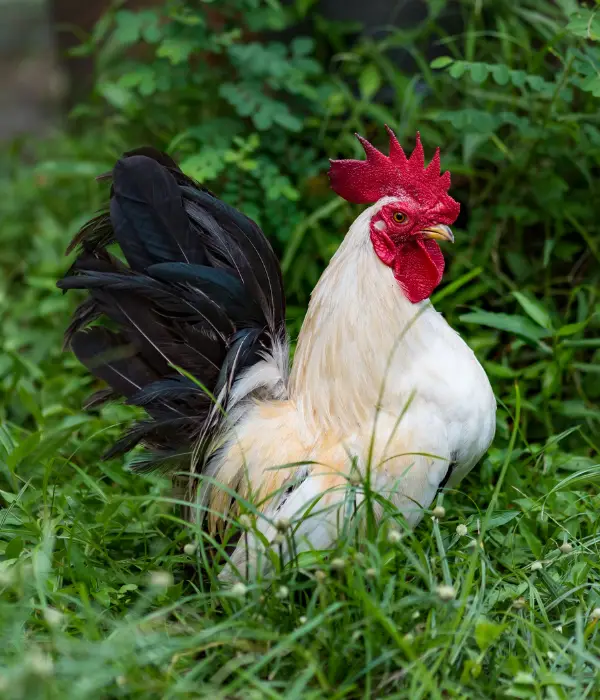
Most garden plants can be a danger to chickens. Chickens often roam around the yard and peck at plants.
While chickens can usually avoid toxic foods, they may eat harmful plants when hungry. Some toxic plants include foxgloves, rhubarb leaves, and azaleas.
Foxgloves contain a compound that can stop the heart. Rhubarb leaves have oxalic acid, which can damage kidneys. Azaleas can cause vomiting, diarrhea, and tiredness.
Other dangerous plants like yew, oleander, and nightshade can affect the nervous system and cause seizures or breathing problems.
Chickens may eat these plants because they’re hungry or curious, or plant parts may fall into their food. Signs of poisoning include drooling, diarrhea, shaking, trouble breathing, and being tired.
If a chicken shows these signs, seek vet help quickly, as treatment can save their lives. To prevent poisoning, learn about toxic plants.
Remove them from areas where chickens have access, or ensure that chickens have plenty of safe food. My neighbor had to rush their chicken to the vet after it ate oleander leaves.
By taking precautions, chicken owners can protect their flock from the hidden dangers of poisonous garden plants.
12. Worm infestation
Worm problems can make chickens very sick. Roundworms, tapeworms, and caecal worms live in a chicken’s digestive system. They take nutrients from the chicken and damage the intestines.
At first, you may notice the chicken has a smaller appetite, loses weight, or has dull feathers. As the worms multiply, the chicken may have diarrhea, look pale, and act weak. This makes the chicken more likely to get other illnesses or be attacked by predators.
Worm infestations can get very bad. The worms may block the chicken’s intestines. Food can’t pass through, and the chicken becomes malnourished. This is deadly for baby chicks that need nutrients to grow.
Some worms, like gapeworms, infect the respiratory system. They attach to the chicken’s windpipe and make it hard to breathe. Chicks and young birds can suffocate from gapeworms.
The worms weaken the chicken’s immune system too. Secondary infections become more likely. Infested chickens may pick out their feathers or attack flock mates due to stress. This leads to more injuries and problems.
Worms in chickens can be a big problem. Chickens with worms may lay fewer eggs. They may also grow more slowly and not be as active. This means farmers and people with backyard chickens could lose money because of worms.
It is very important to prevent and get rid of worms in chickens. You should deworm your chickens regularly. Keep their coop and run area clean.
Don’t let too many chickens live in one space. By doing these things, you can protect your chickens from getting very sick or even dying from worms.
Also read: Read about chickens lice, mites, and fleas
Also read: All about chicken wormers
13. No vaccination
Chickens need care just like other animals. Diseases can make them very sick or even die. But good cleaning, food, and care can help keep them healthy. Getting chickens shots (vaccines) is also key to protecting them from deadly diseases.
Without shots, chickens can get sick from viruses, bacteria, and other germs. These germs cause diseases like Marek’s, Newcastle, bronchitis, pox, and Newcastle Disease.
These diseases bring problems like trouble breathing, shaking, paralysis, organ damage, and sudden death.
For example, Marek’s is a viral disease that spreads easily. It causes tumors in organs and paralysis. Chickens die slowly and painfully. Newcastle is another virus that makes breathing hard, causes shaking, paralysis, and often kills many birds.
Bronchitis is a lung disease from a coronavirus. It lowers egg laying, spoils eggs, and invites other infections. Pox is a skin virus with sores, scabs, and breathing trouble. Severe cases may lead to death.
Laryngotracheitis is another dangerous respiratory disease from a herpes virus. It brings coughing, gasping for air, and suffocation that can kill.
Chickens need shots to fight bad germs. If chickens don’t get shots, the germs spread quickly and make them sick.
The shots help chickens know which germs to fight. This keeps the chickens healthy and stops the germs from spreading to other chickens.
If you have chickens, giving them shots is very important. Follow the shot schedule and ask your vet for help. This will keep your chickens safe from getting sick and make sure they stay healthy and happy.
14. Too much diatomaceous earth
Diatomaceous earth, also called DE, is a natural powder that many chicken owners use to control pests and as a food boost. But if you use too much DE, it can harm your chickens and even cause death.
DE is made from the fossils of tiny ocean creatures called diatoms. Their hard outer shells are sharp and rough.
When you sprinkle DE on chickens or their coop, it dries out and kills pests like mites, lice, and fleas. But those same sharp edges can hurt chickens if they breathe in or eat too much DE.
If chickens inhale DE dust, it can irritate their lungs and airways. They might start coughing, sneezing, or struggling to breathe.
The tiny particles can scratch and damage the delicate tissues inside the respiratory system. Over time, breathing in lots of DE dust could lead to a serious lung disease called silicosis.
Eating large amounts of DE can also harm chickens. A little food-grade DE is usually safe, but too much can irritate the digestive tract. This could cause diarrhea, dehydration, and poor nutrition.
The rough particles might scrape and damage the esophagus, crop, and intestines, even causing ulcers or internal bleeding.
Moreover, DE can pull moisture from a chicken’s body, leading to dehydration. This danger is worse in hot weather or for young chicks, whose small bodies lose water more easily.
To keep your flock safe, use DE sparingly and follow the product instructions carefully. When applying DE to chickens, avoid making too much dust, and ensure good airflow.
Never let chickens breathe in DE directly. If using DE as a feed additive, measure the right dose and watch for any bad reactions.
Also read: Definitive guide to diatomaceous earth for chickens
15. Broken gaps in chicken fencing wire
Gaps in chicken wire can put chickens at risk. Small holes let in weasels, snakes, and rats. Bigger gaps let in foxes, raccoons, and dogs. These predators may kill many chickens and spread fear in the flock.
These gaps also let wild birds, rodents, and other animals in. They might carry bird flu, Newcastle disease, or salmonella. These diseases spread fast through the flock and can kill many chickens.
Chickens are curious and might wander out through gaps. Outside, they face dangers like predators, cars, and toxic plants. Lost chickens may get dehydrated, malnourished, or exhausted, putting them at risk.
Having good chicken wire is key. It keeps chickens safe from predators. It stops illness from spreading. And it keeps birds from going out.
Check the wire often and fix holes quickly. This helps keep your flock healthy and secure. Good chicken wire makes a safe place for your chickens.
16. Coop fire
Chicken coops can catch fire in the backyard. This is very bad for the chickens. Many times, the whole flock dies in the fire. Coops have things like wood, straw, and feathers that burn easily.
Faulty wires, heat lamps, or bedding can start a fire in the coop. If they escape the flames, the smoke can still kill them by damaging their lungs and making it hard to breathe.
Coop fires spread quickly, burning the whole coop in just a few minutes. This means the chickens have a hard time getting out.
They can get trapped inside and die. The chickens also panic and run around, which can hurt or kill them if they trample each other.
To stop coop fires, we must be careful. Check wires and heaters often. Store straw and other flammable things safely.
Make sure the coop has good airflow so it doesn’t get too hot. Put smoke alarms and fire extinguishers in the coop to detect and stop small fires early.
Taking steps to stop fires helps keep chickens safe. A small fire can grow big fast. This can kill chickens and ruin the coop.
Chicken owners must be on the lookout to avoid fires. This keeps chickens from harm and stops a sad loss.
Conclusion (What Killed My Chicken?)
In conclusion, the well-being of your chickens hinges on a multitude of factors, and being aware of these common mistakes can significantly reduce the risk of unexpected losses.
By ensuring robust security measures, safeguarding against environmental hazards, providing adequate nutrition and hydration, and maintaining a clean and healthy coop, you are taking proactive steps towards the longevity and productivity of your flock.
Regular health checks, vaccinations, and parasite control are also crucial aspects of responsible chicken ownership.
Remember, a healthy chicken is a happy chicken, and a happy chicken is one that’s less likely to fall victim to preventable fatalities.
By avoiding these fifteen common mistakes, you’re protecting your investment and fostering a thriving environment where your chickens can flourish.
